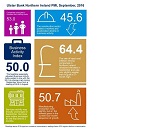17 October 2016

NI output and new orders stagnated during September
The September data from the Ulster Bank Northern Ireland PMI® report – produced for Ulster Bank by Markit – has been released. The latest report indicated that output and new orders stagnated amid a reluctance among customers to commit to spending. That said, companies continued to increase staffing levels. Meanwhile, the rate of input cost inflation remained sharp and output prices rose solidly again.
The main findings of the September survey were as follows:
- The headline seasonally adjusted Business Activity Index posted in line with the 50.0 no-change mark during September, down from a reading of 50.8 in August
- Retailers posted a solid increase in activity, while manufacturing output rose only marginally
- Services activity was little-changed over the month, with construction firms recording a marked and accelerated decline
- The lack of growth in output was matched by new business, which was broadly unchanged in September following a slight fall in the previous month
- Respondents mentioned difficulty in securing new work, particularly given higher charges
- New export orders, meanwhile, increased at a solid pace that was the sharpest since July 2014
- In spite of stagnation of output and new orders, companies continued to increase their staffing levels, in some cases linked to expectations of increases in activity in future
- Moreover, the rate of job creation picked up to a three-month high
- Recent new order weakness, alongside higher employment, led to a further reduction in backlogs of work
- The rate of input cost inflation dipped only slightly from August’s 57-month high in September and was substantial.
- Companies in Northern Ireland raised their output prices at a solid pace in September, extending the current sequence of inflation to 11 months
- The latest increase was mainly a reflection of higher input costs. Retail saw the fastest rise in selling prices, just ahead of manufacturing.
Commenting on the latest survey findings, Richard Ramsey, Chief Economist Northern Ireland, Ulster Bank, said:
While growth in the UK economy as a whole continued to recover from the surprise vote to leave the EU in late-June, the latest PMI data signal that firms in Northern Ireland are facing a more difficult time of things at present. Data for August had shown a return to growth of business activity, but this has been followed in September with a month of stagnation. Moreover, local firms have yet to see a return to new business growth since the referendum, with new orders broadly unchanged in the latest survey period.
There were a couple of bright spots within the latest set of numbers which provide some cause for encouragement. Firstly, the rate of job creation picked up, suggesting that firms maintain some optimism that workloads will start to rise again in the coming months. Secondly, companies continued to see the benefit of a weak pound in export markets, with new business from abroad increasing at the sharpest pace in more than two years.
Sterling weakness has its downsides, however, and the effect on costs for businesses is clearly demonstrated by the PMI data. Input prices continued to surge in September, and local firms often passed these on to clients by way of higher charges. Increased selling prices were mentioned by those respondents that saw new orders decline as customers were reluctant to commit to new projects.
Inflationary pressures in terms of both input costs and output prices were greatest in the manufacturing and retail sectors. Meanwhile, construction firms reduced their charges in spite of a strong pick-up in cost burdens, as they attempted to secure new work in a challenging economic environment. These efforts were often in vain, however, as new business decreased sharply and output contracted for the sixth month in a row. Local constructors also reduced their staffing levels in September, the only sector to do so.
There were signs of weakness in manufacturing at the end of the third quarter, with new orders falling for the first time in seven months and production growth slowing accordingly. Elsewhere, services saw a modest return to expansion in new business, but their activity was little-changed. Retail saw the strongest rise in activity of the four sectors.
The overall picture is one of firms struggling to secure new work in the wake of the vote to leave the EU, with the notable exception being those companies able to capture additional export business, due to the exchange-rate tail wind. Local firms will watch the unfolding picture regarding the type of Brexit we are likely to see closely during the months ahead.
Downloads INTERGRAF OPENS APPLICATIONS FOR THE 2025 YOUNG TALENT AWARD
INTERGRAF OPENS APPLICATIONS FOR THE 2025 YOUNG TALENT AWARD
4 December 2024
Intergraf is pleased to announce that applications are now open for the 2025 Young Talent Award, an initiative designed to inspire and shape the future of the print industry. This year, the Award invites young talent to explore how print companies can effectively attract and engage younger generations to pursue careers in the print industry.
 Intergraf Economic News (Paper Prices) - December 2024
Intergraf Economic News (Paper Prices) - December 2024
5 December 2024
Access the latest edition of the Economic Newsletter for the European Printing Industry for data on paper consumption, and pricing data for pulp, paper, and recovered paper.











